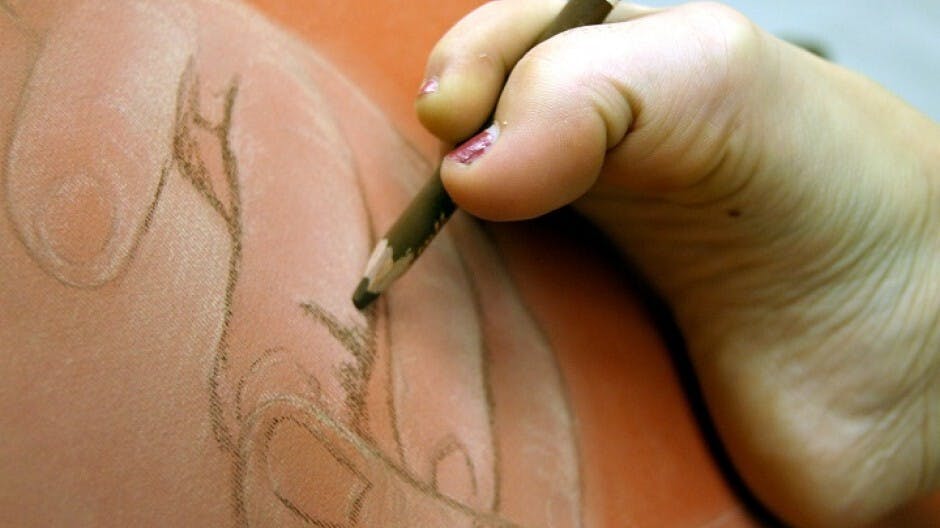三十六計,走為上計,表示逃走才是最好的計策,跟聲東擊西、暗渡陳倉、調虎離山、美人計、空城計、苦肉計等傳統智慧,通稱三十六計,典出《南齊書》。這句成語說事情不得解決,無法可想,只有避開一下,勸人逃走,才是最高明的做法。
You run away with your legs: you take to your legs; you take to your heels; you show a clean pair of hells 都有溜之大吉,一走了之的意思。
Leg 腿,是身體的一部分,包括膝 knee,股 thigh,脛 shin,踝 ankle,足 foot,趾 toe,踵 heel 等。
Foot or feet?
兩者的英文成語,都有不同習慣性的組合,有時不容互調。
Feet 很多時形容一個人的處境,several idioms involving the word “foot” refer to someone’s personal situations,例如:
stand on your own two feet,表示獨立自立,無須別人協助或支援,you are independent and able to look after yourself;
get cold feet,你開始感到懷疑、膽怯、害怕,you become afraid to do something;
find your feet,你變得更有自信,習慣新的工作環境,學會在新環境如何自處,you get used to things and become accustomed to a new situation;
keep both feet on the ground,腳踏實地,注重實際,you take a practical and realistic view;
rushed off your feet,疲於奔命,忙個不停,you are very busy。
Foot 很多時和行動有關,referring to actions,以下是幾個 foot 跟 put 兩字聯在一起的慣用語:
put your foot in it,你的發言,令在座的人感到尷尬或唐突,you accidentally say or do something foolish, tactless, embarrassing;你的說話和行動不得體,招惹麻煩,you unintentionally do or say something unsuitable or insulting;
put your foot down,利用權威,阻止某事發生,you assert your authority;
put one’s best foot forward,全力以赴,begin to do something purposefully;
put a foot wrong,行差踏錯,act unwisely and make a mistake;
you are caught on the wrong foot,則表示事情發生得太突然,你感到驚愕,沒有心理準備。
Heel/Toe/Knee
不同場合的用法:
Heel 經常用來表示放慢腳步,slowing down movement:故意延遲作出决定,可以說 dragging your heels;但是,固執己見,採用堅定的立場,卻應該用 digging your heels;說 digging one’s feet or toes 也可以。Achilles’ heel 則是致命的弱點,希臘神話中英雄阿喀琉斯致命的缺䧟在腳踵,由於該處未能保護自己,結果中箭身亡,that is his vulnerable weakness,今天通指致命傷。至於 follow somebody closely 緊隨某人之後,接踵而至,可以用 tread on somebody’s heels。
但是 tread on somebody’s toes 意思則不一樣,相等於 step on somebody’s toes,形容你觸怒、得罪、冒犯別人,尤指因插手他人的職責,干預他人 interfering,批評他人 criticizing,因此引起對方不悅,傷了他的感情;you offend, upset or annoy somebody, especially by getting involved in something that is their responsibility。至於時刻保持警覺,隨時準備好面對突然出現的狀況,可以說 keep us on our toes。遵守規矩;遵循某某路綫,適宜用 toe the line,而 toe the party line 等於遵循黨的路綫。
不堅定的,容易屈服的人,你可以說他是 a weak-kneed coward, he is easily frightened and intimidated。戰爭中打敗某人,使他屈膝投降或讓步,you bring him to his knees。他單膝跪下向她求婚 = he went down on one knee and asked her to marry him。
Legs
回到 legs:Having long legs 長腿 = leggy;thin legs 瘦腿 = lanky;short and thick legs 短而粗的腿 = stumpy, stubby, piano-legs; having shapely and pleasant legs 美腿 = well-turned legs。
成語「不脛而走」,就是沒有腿也能跑;脛,即是 shin;有些事物,即使沒有腳,也能傳布得非常迅速,例如一個人的名譽、好事、壞事,種種消息快速傳布,可以說是不脛而走。If a piece of news has legs, people will continue to be interested in it and talk about it,受到關注的新聞報道 have legs 便是這個意思。假如某人的理由站不住腳,證據薄弱,提出的指控無法証實或得到足夠支持,都可以用 not having a leg to stand, he is unable to prove something or explain why something is reasonable。至於哄騙地打趣 、捉弄、或取笑某人,通常說 pulling someone’s leg, that means you are only jokingly trying to fool or lie to somebody,例如你用虛構的說話,跟他開玩笑。
本專欄逢周二、五刊登





































